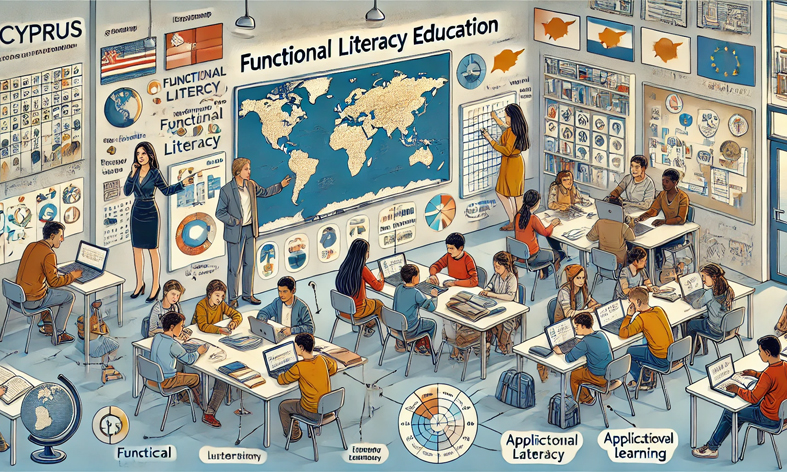
Functional literacy plays an important part in modern education. It links academic knowledge to real tasks, helping learners apply reading, writing, and math in daily life. Students who develop these skills gain independence. They can process information in a better way and solve real problems. Schools in Cyprus give special attention to this concept. They work with families who seek programs that balance theory with practicality.
Defining Functional Literacy
Functional literacy goes beyond basic language or math. It covers reading instructions, writing emails, and analyzing data. Children learn how to manage time, handle budgets, or even compare product prices. A foundation in functional literacy makes them sharper and more responsible. They can assess what is relevant and discard what is unhelpful.
Educators at a Limassol international school might assign projects with real-life examples. These tasks could involve data collection or short interviews with peers. Each step refines a student’s ability to think and communicate clearly. This practical side prepares them for the adult world.
Relevance in Modern Classrooms
High-level theories lose meaning if students cannot apply them. Many private schools in Limassol make functional literacy a top priority. Classrooms focus on tasks that demand problem-solving. Pupils might design small-scale science projects or run a mini business fair. They learn by doing, not just by listening.
Functional literacy also affects personal growth. It shapes how learners speak up, debate ideas, and interpret media messages. English-based lessons at an English school Limassol might use local news to teach reading comprehension. This method expands vocabulary and builds awareness of social issues.
Cultural and Language Contexts
Cyprus is multicultural. The island has families that speak Greek, Russian, and English. A russian school Limassol might adapt functional literacy lessons to its bilingual student body. Pupils practice reading in two languages and compare cultural norms. This approach leads to deeper understanding of the world.
Mixed-language settings reinforce flexible thinking. Students see that good communication is about clarity, not just grammar. These interactions sharpen social skills and global awareness.
Real-World Connections
Teachers in school Cyprus settings often mix daily life with academic goals. A mathematics class might include tasks such as planning a trip budget or reading bus timetables. Pupils see the link between multiplication tables and actual finances. They see the value of fractions or decimals when measuring or splitting recipes.
One activity that supports this approach is summer camp Cyprus. Attendees engage in group projects, outdoor challenges, and creative lessons. These experiences help them refine functional literacy while bonding with peers. Short writing tasks or budget tracking can appear in a casual setting. This practical style sticks with learners.
The Role of Secondary Education
Teens in secondary school Cyprus need functional literacy for complex assignments. They might analyze historical events or debate climate change. Each task demands structured thinking and articulate writing. Many schools blend the ib education system with local or national syllabi. The result is an advanced framework with inquiry-based learning. Students present projects and evaluate source credibility.
This stage also sets the groundwork for future careers. A teen with functional literacy will likely handle job interviews, course selections, and financial planning. They can decode legal or bureaucratic documents in the future.
Teachers and Parents as Key Partners
Teachers guide classroom tasks that nurture functional literacy. They create lessons with relevant themes. Many private institutions have staff who mentor students in small groups. This format allows individual feedback. Learners can practice speaking skills, test ideas, and refine approaches.
Parents also play a vital role. Children need consistent support at home. A shared reading schedule or math puzzle time builds confidence. Family conversations about local news let students voice their thoughts. Each casual chat can sharpen literacy skills.
Adapting to Different Learners
Functional literacy fits diverse learning styles. Children who like hands-on tasks might do science experiments. Others may write short stories or compose digital presentations. An English school Limassol might post reading lists or encourage drama clubs, fostering expressive skills. Flexible methods help each child find their preferred path.
Teachers observe which activities spark interest. They build on these strengths. This personalized angle helps children stay motivated and see that literacy is not just about memorizing facts.
Conclusion
Functional literacy serves as the backbone of practical education. It spans reading, writing, math, and critical thinking. It prepares young minds for daily challenges. Schools in Cyprus—whether a Limassol international school, a bilingual campus, or an IB education system environment—are integrating these methods. Their focus is clear: turn theory into skill sets that young people use beyond the classroom.
A child who masters these abilities will function well in social, academic, and career settings. This foundation opens many doors. It sparks confidence, problem-solving, and curiosity. Students then grow into adults who engage effectively with the world around them.













